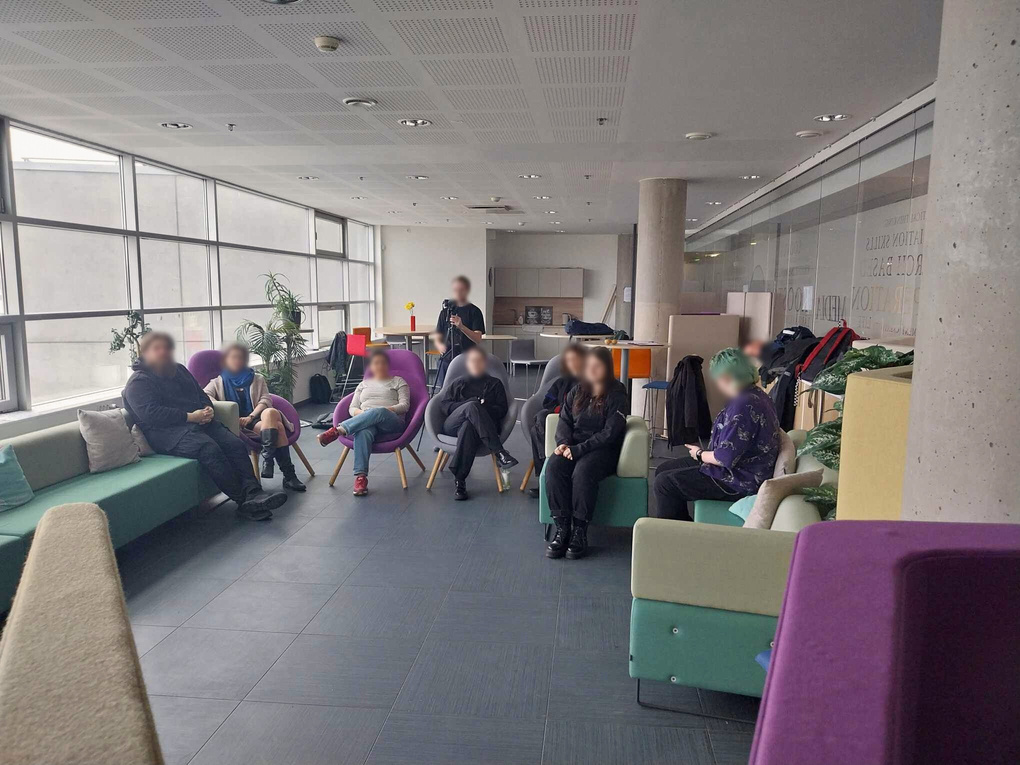Beyond the Facade: Decrypting Pseudo Activism
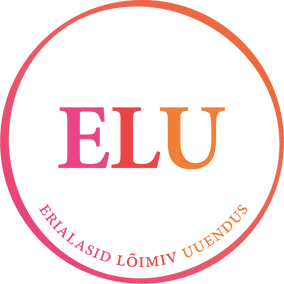
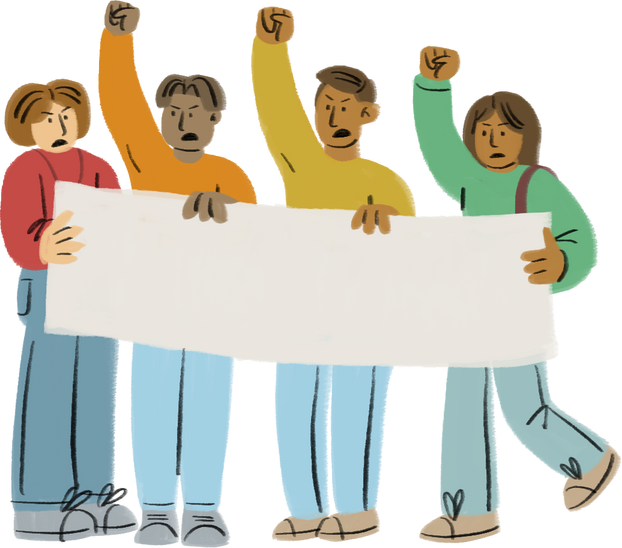
A Project Portfolio
Supervisor:
Maliheh Keshmiri

Respective disciplines
- Well-being and Health Behaviour (Angelina)
- Slavonic Languages and Cultures (Nikita)
- Anthropology (Hanna)
- Special Education (Arina)
- Russian Philology (Anna)
Project Divisions
Group 1
Group 2
Rep: Angelina
Nikita
Hanna
Arina
Anna
Rep: Fatemeh
James
Aurelius
Terje
Geilyn
Maria

Respective disciplines
- Anthropology (Fatemeh)
- Education (James)
- Law (Aurelius)
- European Languages & Cultures (Terje)
- Integrated Natural Sciences (Geilyn)
- Anthropology (Maria)


Introduction
This project delves into the troubling phenomenon of pseudo-activism, where actions appear to champion a cause but lack the substance to drive real societal change. We call it "beyond the facade" because these performative gestures often mask a lack of genuine commitment.
Using a unique blend of theory and practical exploration, this project aims to unmask how pseudo-activism can distort public perception and undermine the effectiveness of genuine activism. Through a combination of theoretical analysis and innovative methods like role-playing and film engagement, we will explore how performative actions influence public understanding of activism's true potential. By focusing on real-world examples within the context of current events, the project seeks to provide deeper insights into the complex dynamics between genuine activism and its performative imitators.
To enrich the analysis and explore diverse perspectives, the project will be divided into two separate groups, each tackling an independent topic related to activism within the context of today's economic and political challenges.

Fostering Multifaceted Analysis: The Power of Diverse Perspectives
To ensure a rich and nuanced understanding of activism, the project embraced interdisciplinarity. Each group included students from a variety of academic backgrounds, such as Modern Languages and Cultures, Anthropology, Special Education, Philology and Law. These diverse perspectives, while not directly tied to activism studies, proved invaluable. By bringing together different outlooks on economic, political, and social issues, the project was able to:
Blend performance art with real-world challenges: By considering diverse viewpoints, both groups were able to create performances that resonated with a broader audience and reflected the complexity of real-life activism.
Divide project tasks effectively: The variety of backgrounds and skillsets within each group facilitated a more efficient allocation of tasks, ensuring each member contributed their strengths.
This interdisciplinary approach fostered a richer analysis of pseudo-activism and its impact.
Project Report
Group 1
In an era characterised by heightened social consciousness and advocacy, the phenomenon of pseudoactivism emerges as a pertinent topic for exploration. Our project, "Beyond the Facade," aims to dissect this phenomenon through performance art and analysis, fostering dialogue and insight into the complexities of modern activism.
Aim of the project
- To reveal the concept of pseudo-activism by studying special literature, including media content.
- Investigate how do audience members perceive the authenticity of pseudoactivist behaviors portrayed in the performance.
- Find out if exposure to the performance influence audience members' intentions to engage in activism or other forms of social action.
Theoretical Frameworks (Harrebye 2022, Lightfoot 2019, Martin et al., 2007, Park and Rim 2020, Parkinson and Herring 2022) that are useful for understanding the social processes, social influence and group dynamics in different types of pseudo-activism:
- Social Constructionism
- Framing Theory
- Symbolic Interactionism
- Social Identity theory
- Social Influence
Performance
To explore pseudo-activism's impact, we designed and filmed a performance mimicking pseudo-activist behaviors.
Bold statements demanding accountability from authorities accompanied the distribution of basic goods, highlighting the disparities within society. The audience was left to ponder the authenticity of activism in today's world, spurred to reflect on their own role in effecting genuine social change.
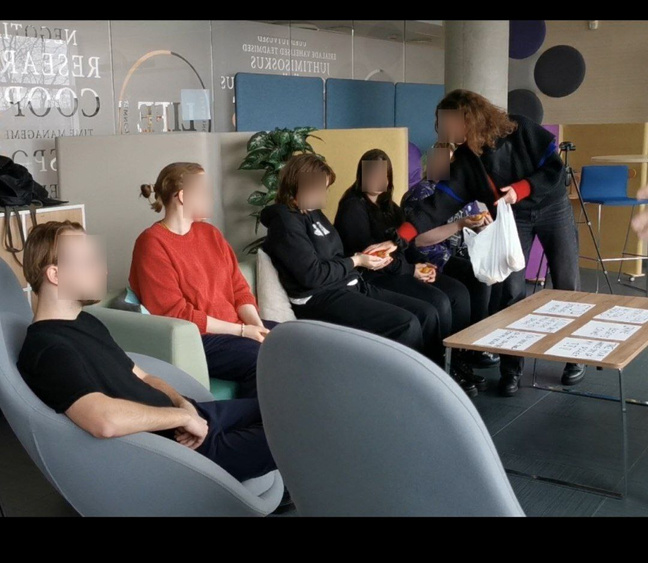
Picture 1. Sharing “stolen food”
How we came to the idea
Our exploration led us to the realisation that the issues of high prices and increasing taxes are pervasive concerns that affect individuals across diverse socioeconomic backgrounds, making them highly relevant and pressing topics of discussion in contemporary society.
Brainstorming our performance format proved challenging. We needed to strike a balance: portraying pseudo-activism (pointless actions) while conveying a deeper message. Focusing on the core message first, we developed the slogan "If you steal from us – we'll steal from you." Theft then became the thematic thread for the performance, guiding our final decision.
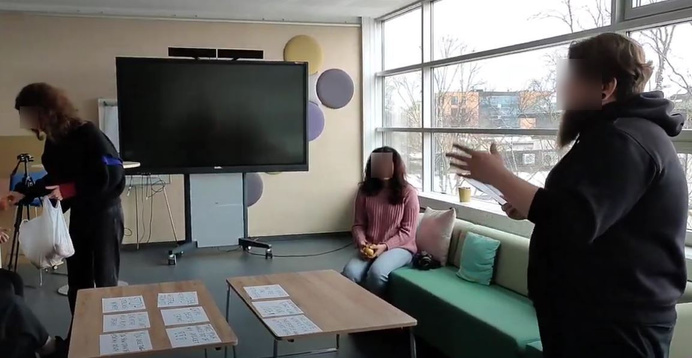
Picture 2. Colling statements

Picture 3. Sharing the messages on the table with audience
Ethical Considerations and Privacy
Privacy was meticulously safeguarded throughout our project, ensuring the confidentiality and anonymity of participants' responses and interactions.
Analysis
Cameras captured audience reactions, including facial expressions, body language, and verbal responses during and after the performance. We also conducted a questionnaire to gain deeper insights from participants' personal reflections.
Analysing audience responses (confusion, skepticism, recognition, amusement) revealed a spectrum of perceptions regarding pseudo-activism. Post-performance interviews and surveys yielded further insights into the beliefs and assumptions that influence how people distinguish activism from pseudo-activism. Participants thoughtfully reflected on the performance's authenticity, messaging, and their own encounters with pseudo-activism in society.
Questions that were asked after performance
1. If you saw this performance in a public place, how would it make you feel/what thoughts would arise?
2. If you saw this performance in a public place, what sort of action would it prompt from you? Would you for example stay and observe, film, walk away or do something different?
3. Do you think that seeing a performance like this in public would change your beliefs and behavior in some way? Or other people's beliefs and behavior?
Key findings
The ways in which issues are framed and communicated significantly influence how they are perceived by the audience.
We observed how audience members were influenced by the reactions of others, as well as the broader social context, in forming their perceptions of pseudo-activism.
Audience reflections might reveal a strong sense of empathy towards the activists' cause, with many expressing solidarity and a desire to take action. This might suggest that the performance effectively humanized the issue of economic inequality, fostering a sense of shared struggle among community members.
By presenting universally agreeable statements the activists were able to subtly manipulate the audience's perception and elicit a sympathetic response. This may suggest potential vulnerability to manipulation and highlights the importance of critically evaluating the persuasive tactics used in activism.
Outcomes
We asked the audience to answer a few questions about their reaction to our performance.
The answers to the full questions varied, some of them quite predictable, but it was interesting to note how close some people were to agreeing with the idea of our performance. When we were thinking about our performance, an important part of the idea was that we needed to present a rather bad idea convincingly.
For several minutes we expressed ideas that are difficult to argue with: “The government must take care of its people! The government must listen to its people! Raising prices is bad!” And at the end we gave people the idea of breaking the law, thus manipulating the listener into thinking that the last statements are as undeniable as the first ones. For some it worked or almost worked, we can assume that if the performance were larger and brighter, perhaps such an act could convince even more people to participate in theft and lead to serious consequences.
Audience reflections might reveal a strong sense of empathy towards the activists' cause, with many expressing solidarity and a desire to take action
Potential Stakeholders
- Academic Communities (future research)
- Social Activists (strategies for changes)
- Media and Journalism (communication)
- Policy Makers (social justice and engagement)
Potential Affected Parties
- General Public (especially those engaging with social issues and activism, may be impacted by our findings, challenging their perceptions and prompting critical reflection)
- Activist Communities (enhancing the effectiveness of their advocacy efforts)
- Social Media Users (engagement with digital activism)
Continuation of Research:
The implications of our project extend beyond its initial scope, suggesting avenues for further research and exploration.
Future studies could delve deeper into specific aspects of pseudo-activism, such as its impact on marginalized communities, its relationship with consumer culture, or its role in shaping public discourse.
Additionally, longitudinal studies could track changes in perceptions and behaviors over time, providing valuable insights into the evolving landscape of activism in contemporary society.
Group 2
Problem Description
The second group of the "Beyond the Facade” project investigates the distinction between genuine and performative activism in the context of the Russian-Ukrainian war. It scrutinizes how certain activist efforts, while outwardly supportive, may actually lack substantial impact, serving more as symbolic gestures rather than effecting real change.
Method Choice
The methodology combines theoretical analysis with practical role-play to explore the effectiveness and perception of activism:
Theoretical Frameworks:
Performative Activism Theory: In the figurative sense, analyzes activism focused more on self-promotion than societal change.
Framing Theory: Helps understand how the presentation of activism influences public perception.
Social Capital Theory: Examines motivations behind public endorsements of activism, particularly through social networks. In exploring the theoretical foundations of our study, we have developed a comprehensive manuscript outlining our research framework. (See annexes for literature review)
Empirical Practice:
Role-Play Simulation (Part 1): Features a performer soliciting signatures for a vaguely defined petition, testing audience reactions to ambiguous activism.
Role-Play Simulation (Part 2): A dramatic scene with a performer accusing the audience of complicity in the conflict, aimed at gauging the emotional impact of intense activist portrayals.
Both simulations were filmed and analyzed to evaluate:
The audience’s ability to discern the authenticity/effectiveness of activism.
The impact of different activist strategies on audience engagement and emotional response.
This approach aims to clarify how pseudo-activism can be identified and differentiated from genuine activism, particularly in high-stakes contexts like international conflicts.
Academic Research and Role-Play Development
The project combined in-depth theoretical research on activism, particularly within the context of the Russian-Ukrainian conflict, with practical experiments to analyze performative activism. Insights from various case studies led to the creation of a two-scene act, designed to explore the impacts of pseudo-activism on both performers and observers.
Filming and Audience Feedback
Initially intended to use a dual-camera setup to capture both the performance and audience reactions, the project faced technical setbacks that prevented filming the audience. Instead, questionnaires were distributed to collect feedback, offering valuable insights despite the lack of visual data.
Ethical Considerations and Privacy
To adhere to privacy concerns and ethical standards, each project group served as the audience for another, minimizing external engagement and preserving participant confidentiality. This controlled setting reduced stakeholder outreach but maintained ethical integrity.
Broader Impact and Utilization
The project's findings are set to benefit social researchers and student organizations at Tallinn University, like TLU Students for Ukraine, by providing valuable resources for understanding and teaching activism. This strategy ensures the project's contributions extend beyond its immediate scope, supporting ongoing social research and awareness initiatives.
Sustainability and Future Implications
The "Beyond the Facade: Decrypting Pseudo Activism" project addresses privacy concerns by limiting outreach to the internal audience at Tallinn University, focusing on student activist groups, researchers, and university digital hubs. Despite the restricted external communication, the project's results have significant potential for inspiring and informing future research within the university.
As our team members are nearing graduation, our direct involvement will conclude with the project's end. However, to ensure the project's sustainability and continued relevance, we will transfer the rights of use to the ELU project program coordinators. This will allow them to leverage the findings for future projects and academic exploration, maintaining the project's impact within the academic community of Tallinn University.
Communication to Stakeholders
Our project ensures accessibility and engagement through several strategic channels:
Public Accessibility via Blog
The project portfolio is available publicly in blog format, allowing easy access for extended discussions and interaction with the content. This platform facilitates engagement from a broad audience both within and outside of Tallinn University.
Usage Rights for ELU Program Coordinators
We have granted rights of use to the ELU program coordinators, allowing them to employ the project's outcomes in future research and projects related to performative activism and related studies.
Academic Utilization at Tallinn University
Academic members at Tallinn University can use the project results for further research and as educational material in classrooms and seminars, enhancing the academic discourse around activism.
Support for Student Activist Groups
Student groups such as TLU Students for Ukraine can leverage the insights from our project for planning and executing more effective activism campaigns, particularly in spreading awareness and engaging the community.
These communication efforts ensure that the project's findings are integrated within academic and student activities at Tallinn University, promoting ongoing discussion and application of our research on pseudo-activism.
Results
Performance & Audience reflection
The following photograph captures the audience's engagement before our group's role-play session on April 24, 2024, illustrating the participants' attentiveness and setting the stage for the subsequent activities.
Post-event, we asked the audience to answer to a few open-ended questions to gather their feedback and insights. The results are documented comprehensively in the following analysis document. (See annexes for raw survey form and reflections analysis)
Picture 4. The audience before group 2 role-play on the 24.04. Pictuire taken by Geilyn Jänes on 24 Aprill 2024.
The recording of group 2's role-play on 24.04.2024.
Video 1. Group 2 performance. Edited and transcribed by Aurelius Pärn.
Project Action Plans
Group 1
Activity and Short Description | Timeframe | Stakeholders | Person (name + study field) or Teams Responsible |
Explore Pseudo-Activism conducting a literature review; examining the media content on various forms of pseudo-activism and share results with the group, creating a literature review | 10.03 | All researchers | |
Create a scenario for Group-video, Mid-term report writing | 17.03 | Anna Churakova Nikita Afanasjev Angelina Strelnikova | |
Make a video, showing the “pseudo activism” in society, collect the audience reflections by asking questions | 24.04 | Hanna Seenemaa (filming), Anna Churakova (role-play), Nikita Afanasjev (role-play), Angelina Strelnikova (filming) | |
Data analysis, video editing, creating portfolio, self-reflection | 10.05 | All researchers |
Group 2
Activity and Short Description | Timeframe | Stakeholders | Person (name + study field) or Teams Responsible |
Initial research phase; finding theories and case studies | 08.03 | - | All Group 2 members |
Annexed literature review | 15.03 | - | Fatemeh, Maria |
Coordination, presentation, documentations and graphics | throughout | - | Fatemeh |
Scenario making, performance | 10.04-25.04 | - | Fatemeh, James, Aurelius (coordination, assistance) Geilyn, Maria, Terje (role-play) |
Reflection data analysis | 10.05 | - | Geilyn (Analysis), James (Thematization) |
Cinematography and editing | 10.05 | - | Maria (Recording) , Aurelius (Editing) |
Self Reflections
Group 1
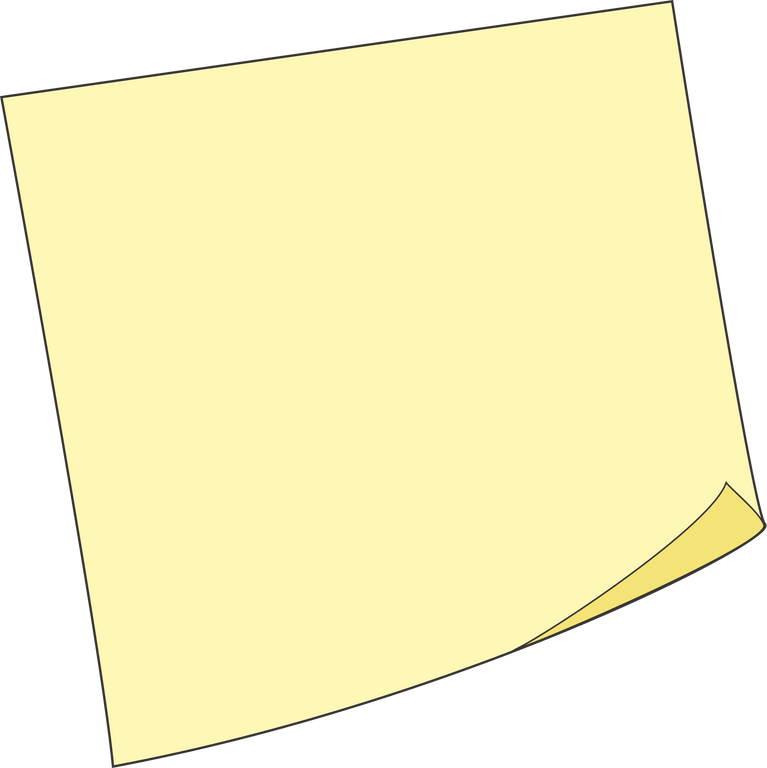
Angelina
Hanna
Arina
Nikita
Anna
Angelina
I joined the project with a keen interest in exploring the phenomenon of pseudoactivism and its societal implications. My expectations were to engage in meaningful dialogue, challenge perceptions, and contribute to a deeper understanding of the topic. As a representative of the group, I took on the responsibility of organization and management, overseeing paperwork and coordinating filming activities. Our diverse team fostered innovative thinking and minimal conflicts were resolved through open communication. I believe all team members made substantial contributions. I learned the importance of collaboration, adaptability, and effective communication. Victories stemmed from teamwork and perseverance. The project was fulfilling, providing valuable insights and fostering growth. I feel accomplished and grateful for the experience, and will apply the lessons learned in the future. I recommend continued interdisciplinary collaboration and hands-on learning opportunities.
Arina
I am really happy that I joined this project, because it helped me to develop my teamwork skills, analytical skills and meet new people from various fields. Right from the beginning, I was intrigued by the concept of pseudo-activism and was determined to highlight its nuances in our video. Many people overlook the fact that some forms of "activism" can actually be harmful and counterproductive.
Personally, I gained a lot of knowledge from the literature analyze and I am happy to use this knowledge in the future. Thanks to the research part I started to think about myself as an activist. In the beginning, I couldn’t find a definition of pseudo-activism but in the end of the LIFE project I learnt to make difference between activism and pseudo-activism. (And of course, this definition is really different for everyone in our group). I also developed my discipline, which is the most useful skill for me during my university studies
Despite the challenges we faced as a team, I consider the project a success. Each member was dedicated to completing their tasks on time and actively contributed to discussions about our next steps. The collaborative atmosphere, where everyone freely shared ideas and supported one another, was truly inspiring.
Also, the special thanks to our supervisor Maliheh, who helped us to solve our problems and was really supportive from the beginning of the project. Without her, we would not achieve this successful result.
Hanna
Participating in this ELU project was a valuable academic experience for me. Despite having participated in a couple of different forms of activism in my life, this project was the first time I heard the term ‘pseudo-activism’. That is one of the reasons I chose this project. Delving headfirst into a topic that is foreign to me seemed like a great challenge to take on in an interdisciplinary group. Now that we are in the end stages of this venture, I can say that the diverse group proved to be very useful in broadening my own perspectives and approaches to the topics of activism and pseudo-activism. Additionally, I gained experience in different skills throughout this project, such as teamworking, researching and planning a project. My favourite parts of this project were the discussions we had during our group meetings - they were very fruitful and unlocked new viewpoints for me.
Nikita
Honestly speaking, I have mostly good thoughts about the project. It was interesting and fun to participate in. It made me do some research on the problem we were discussing in our performance, and it made me think about the issue seriously while coming up with unconventional ideas to "fight" it. About 2-3 years ago, I started thinking more about political and social problems. I realized that it is important to be aware of the current political situation, so this project helped me get more in touch with our economy and made me reflect on my own thoughts i had earlier about social activism and our government. I also thought that it would be great if we were allowed to do our performances outside or with a larger audience because it would have given us an opportunity to collect more data and honest reactions to our project.
Anna
Although the topic of the project is not really connected with my faculty, I joined it because of the inner interest and desire to discuss and deal with the question. It seemed significant for me since nowadays it is hard to recognize if anyone aims for real changes or for the popularity or provocation that is meaningless and actually empty. Also my thoughts were so contradictory and conflicting and I wanted to make it clear for myself.
I was responsible for the Mid-term report and I was representing it during the session. Also I participated in our performance and made slogans. I think we did a really good job and made a connection between all group members from the first day of our meeting. We did not have any conflicts and anyone was always ready to listen to others' opinions. We discussed every question freely and were able to handle disagreements.
I challenged myself during the performance. I took the role of a pseudo activist, who believes in own strength and ability to awaken people and grab their attention to the problem. It was quite curious and important as well to get outside perspective from other groups during the mid-term session and to receive constructive criticism.
I personally appreciate the experience that I got from this project. I got lucky with team members and with my supervisor. It was pretty easy to communicate with everyone and get help if needed. Of course teamwork skills were needed and I will use it in the future.
Group 2

Fatemeh
Geilyn
Liis (James)
Maria
Aurelius
Terje
Fatemeh
When I initially joined this project, I was unsure of our objectives. However, as we started preparing, our goals became clearer. Despite our time constraints and limited audience, we successfully created a small piece of performative art for a significant cause like the Ukraine war. Even though the project was small-scale, I gained valuable experience in coordinating, planning, and in transforming theory into performance. This project highlighted that even art, often associated with creativity and improvisation, requires meticulous planning in practice. I would however have liked it if we could perform to a larger audience or reach out to more people, but given the time limit and other factors, the work remained small in scale.
Geilyn
Participating in the LIFE project was a rewarding journey of personal and academic growth. As a student of integrated science, stepping into the realm of activism, outside my usual academic boundaries proved both challenging and immensely valuable. Throughout this experience, I gained insights into the significance of teamwork, the importance of confidently expressing ideas, and the delicate nature of effective activism. Understanding how to engage audiences and convey messages clearly emerged as an important lessons. Moreover, navigating language barriers made me expand my vocabulary more. Reflecting on these experiences, I feel significantly more equipped to contribute meaningfully to future endeavors and advocate for causes close to my heart.
Maria
Throughout this project I have tried to be an active participant, showing the initiative and contributing to the group-work as much as possible. And I enjoyed this role a lot. I feel like I have gained a slightly different perspective on what I before perceived as pseudo-activism and thanks to that I am able now to perceive pikitucal and actuvist actions more critically and distance myself from the immediate judging and labeling. I feel that I was able to express myself creatively, that I had an opportynity to offer my ideas to the group and I was supported by other team-members. Another outcome I’d like to note is a time-menagement - I saw the positive side of setting the deadlines and how helpful it was to think through the action-plan in the very beginning(yet be flexible), and now I might wanna integrate it into my own life.
Liis (James)
I initially joined this project because I have a little bit of experience in activism and wanted to learn more about it. Taking part of this project gave me insight into what really is activism and what differentiates it from pseudo-activism. I got firsthand experience in what goes into researching, creating, writing and executing an activism related project. I also got my first experience in being a part of a project overall and learned what it really means to be a part of a team. I got to hone my conversational skills in a secondary language and gained more confidence in expressing myself and my ideas to other team members. I am glad that i took part of this project because aside from taking a mandatory course i got to meet other like-minded people and learned about activism from academic texts and other people’s point of view .
Aurelius
I have never participated in protests, because I have always felt that it does not really do much. When I first heard about this project, I immediately recognised my opportunity to study about the effectiveness of activism. I met my initial goal of finding out which way of activism has a bigger chance of actually ending up in real world change. It was certainly beneficial to learn about other people’s perspectives on the issue and the way we should achieve our project’s goals in a professional environment without getting sidetracked. I feared that we would get sidetracked by arguing about politics as well as not agreeing on what would constitute effective activism, but we did not have such problems at all and I would not contribute that to just luck, I find that we avoided these issues by remaining professional and focusing our goals.
Terje
Participating in Beyond the Facade: Decrypting Pseudo Activism was a very useful learning experience. Not only did the project help me comprehend the topic of pseudo activism better, it also provided me with useful skills, such as working in a group with minimal supervision, thinking outside the box and combining theoretical knowledge with creativity. In addition, I gained multiple friendships and acquaintances, it was very interesting to work with them. There were difficulties at times, but I believe the project goals were achieved sufficiently. We familiarized ourselves with the various definitions of pseudo activism, got to role play in front of an audience, record the performance and analyze the viewers’ reactions. Overall, working on the project was interesting, it provided me with many new experiences, which could be helpful going forward. Thanks to teamwork, our responsible group representative and tips from our supervisor, we achieved our project goals.
Sponsored by:

Annexes
Group 2, ELU Project: Beyond the Facade: Decrypting Pseudo Activism. (2024).
Description: Theoretical background and literature review. Unpublished manuscript. View here
Jänes, G., & L. J. Kliimov (2024).
Description: Thematic Analysis of Audience Reflections. Document collected from the audience on 24 April 2024. View here
Jänes, G.(2024).
Description: Feedback survey. Unpublished raw data. View here
References
Goffman, E. (1974). Frame analysis: An essay on the organization of experience. Harvard University Press. Retrieved from https://urup.or.id/wp-content/uploads/2020/07/Erving_Goffman_Bennett_Berger_Frame_Analysis_BookFi.pdf
Harrebye S. (2022, April 4). The Copenhagen Experiment: Measuring the relative effectiveness of creative vs. conventional forms of activism. The Commons. https://commonslibrary.org/the-copenhagen-experiment-measuring-the-relative-effectiveness-of-creative-vs-conventional-forms-of-activism/
Kepe, M., & Demus, A. (2023). Resisting Russia: Insights into Ukraine's civilian-based actions during the first four months of the war in 2022. Retrieved from https://www.rand.org/pubs/research_reports/RRA2034-1.html
Lightfoot E. B. (2019). Consumer Activism for Social Change. Social work, 64(4), 301–309. https://doi.org/10.1093/sw/swz035
Martin, D. G., Hanson, S., & Fontaine, D. (2007). What Counts as Activism?: The Role of Individuals in Creating Change. Women’s Studies Quarterly, 35(3/4), 78–94. http://www.jstor.org/stable/27649696
Morozov, E. (2011). The net delusion: How not to liberate the world. New York: Penguin. Retrieved from https://tropicaline.files.wordpress.com/2011/04/netdelusion.pdf
Park, K., & Rim, H. (2020, April). “Click First!”: The Effects of Instant Activism Via a Hoax on Social Media. Social Media + Society, 6(2), 205630512090470. https://doi.org/10.1177/2056305120904706
Parkinson, C., & Herring, L. (2023). “Vegan celebrity activism: An analysis of the critical reception of Joaquin Phoenix’s awards speech activism”. Celebrity Studies, 14(4), 584-601. https://doi.org/10.1080/19392397.2022.2154684
Saarts, T., & Jakobson, M. (2016). “Civic engagement in policy-making processes in Estonia: A controversial success story”. Der Donauraum. Retrieved from https://www.researchgate.net/publication/334998206_Civic_Engagement_in_Policy-Making_Processes_in_Estonia_A_Controversial_Success_Story
Ventzislavov, R. (2023). “Performative activism redeemed”. The Journal of Aesthetics and Art Criticism, 81(2), 164-172. https://doi.org/10.1093/jaac/kpad006
Woolcock, M. (1998). “Social capital and economic development: Toward a theoretical synthesis and policy framework”. Theory and Society, 27, 151-208. https://doi.org/10.1023/A:1006884930135
Голуб'як, Н. (2017). Он-лайн технології громадянської участі: позитиви та негативи електронної демократії. Retrieved from https://journals.pnu.edu.ua/index.php/politics/article/view/4185/4762
